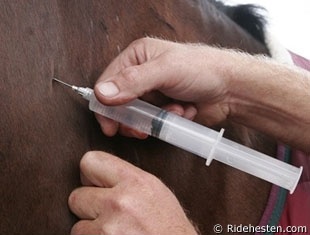
The newly voted Progressive List has sent shock waves through many national federations at the FEI General Assembly in Copenhagen last week. All national federations, which voted to accept the list, are now realizing the consequences of their own vote and are awestruck.
105 national federations were gathered at the 2009 FEI General Assembly and 102 voted for the Progressive List: 53 were in favour of Progressive List, 48 against it, 1 abstained. The Progressive List includes controlled medication and allows horses to have a certain level of non-steroidal anti-inflammatory (NSAIDs) before competitions. This is a radical turnover from the FEI's no-tolerance policy.
The reputation of the equestrian sport has recently been tarnished by a huge amount of doping scandals especially involving show jumpers, but also in dressage (Isabell Werth) and endurance (Sheik Mohammad Al Mahktoum).
Shock Wave Through the Spine
A shock wave shook the General Assembly on its foundations when FEI veterinary director Graham Cooke asked to vote on the controlled use of phenylbutazone, salicylic acid (aspirin), flunixin (Banamine), acetylating, dichloroacetate (lactanase) and isoxuprine after a two-hour Clean Sport Workshop led by Lord Stevens. Initially many national federations were against Cooke's proposal but one day later and after some behind the scenes discussions the Progressive List was accepted.
Only soon after many NF representative realised the impact of what they have just accepted and were left stupefied. In the afternoon German FN president Breido Graf zu Rantzau requested a re-vote on the matter but it was rejected by FEI president Princess Haya on the grounds that several delegates had already left the Assembly.
The Chronicle of the Horse reported that FEI vice-president Sven Holmberg was moved to tell the floor, “what you have just done has cut the legs off the clean sport campaign. If you thought recent media reaction against rollkur has been tough, just wait to see what happens with this.”
So What Has Been Accepted?
The Progressive List allows the use of NSAIDs only to be administered between competitions. The limit of administration of 1 gram in 24 hours, not within 12 hours of competition.
In more detail this implies the administration of phenylbutazone (up to 8 mcg/ml in plasma or serum), salicylic acid (up to 750mcg/ml in urine and up to 6.5 mcg/ml in plasma or serum) and flunixin (up to 500 mcg/ml in plasma or serum) so long as those substances are not detected in a horse's sample above the prescribed limits noted and are used in isolation and not combined.
The progressive list also sanctions acetylcysteine, dichloroacetate (lactanase) and isoxuprine. The allowed level of "bute" is now four times higher than the threshold accepted in the 1990s.
At the Assembly FEI officials justified the use by stating, "the World Anti Doping Agency has no restriction on the use of NSAIDs for human athletes. We should be able to treat not only our human athletes as approved by WADA, but also, and under similar principles, our horses close to competition. These very low levels have been established based on scientific evidence specifically to protect the welfare of the competition horse. The data that was requested was to establish the levels needed to provide minor anti-inflammatory relief only.”
Post-Factum Reactions
Five days after the 2009 FEI General Assembly national federations and highly placed officials are struggling to cope with the consequences of the vote.
Frank Kemperman, FEI Dressage Committee chairman and CHIO Aachen show director said, "in an attempt to improve the situation, it went completely insane. They now have allowed limits of a certain substance that can make a lame horse go sound. This has never been the intention."
Germany voted against the Progressive List. German NF secretary-general Sönke Lauterbach called it "a disaster" and said "it is a clear step backwards on our way to a clean equestrian sport. The Progressive List does not answer to our image of healthy, unmanipulated horses in competition."
The Progressive List has also brought about a legal cul-de-sac. "In countries such as Germany, Sweden and France the now allowed substances are prohibited by law. We can't even accept those substances at our shows, even if we want to," said Kemperman.
Dutch Equestrian Federation top sport manager Maarten van der Heijden confirmed that "bute" is not a prohibited substance in The Netherlands. "But we are investigating if the new rules are good," Van der Heijden stated. "Kemperman might be a bit harsh in his words but in general we agree with him. On the other side, the decisions have been made in accordance with WADA rules for humans."
Previously the FEI carried out a no-tolerance policy. "It is good we went into the other direction. There was a list at hand which would allow these substances under certain conditions. Only some inexplicable things have been added to it at the last moment," Kemperman clarified. "What we now have is unacceptable."
According to Van der Heijden the Progressive List requires further investigation. "We have to ask ourselves if this is good for the image of the sport. Probably some of the substances are allowed for good reasons, but the allowed amounts have to be minimized. Scientists should look at it. Furthermore it can't be happening that within Europe there is an inequality in the application of the rules."
Photos generous courtesy: Ridehesten.com
Read More
- A Petition Against the Progressive List Set up 24 November 24, 2009:
www.no-fei.com - Chronicle of the Horse: Shocking Vote Legalizes Bute In FEI Competition
- KNHS: Kemperman Says New Doping Rules are Absurd
- Hest og Rytter: Sweden Against Progressive List
- U.S.A.: FEI warns sport is 'as good as dead' if not cleaned up
Related Links
National Federations Vote For Progressive List at FEI General Assembly
Horses Allowed to Compete on Bute!? Tumult at FEI General Assembly
FEI Extraordinary General Assembly Votes Against New Statutes